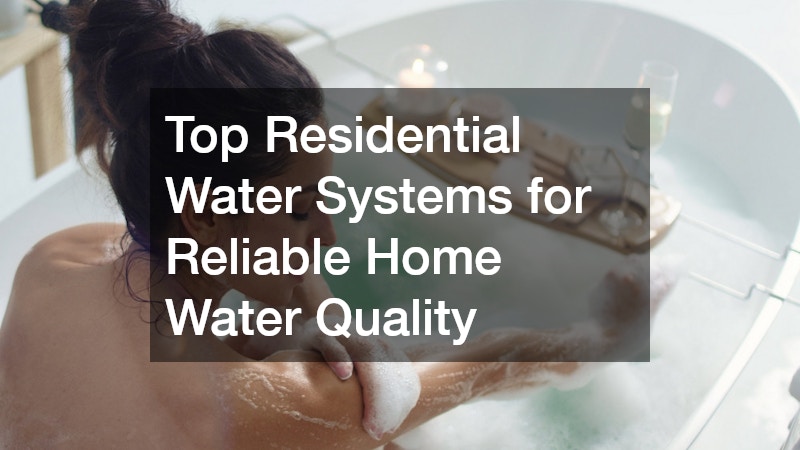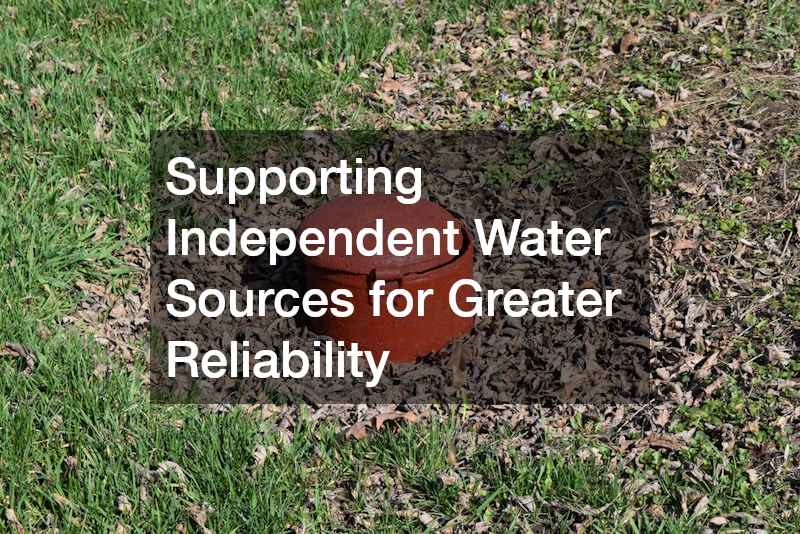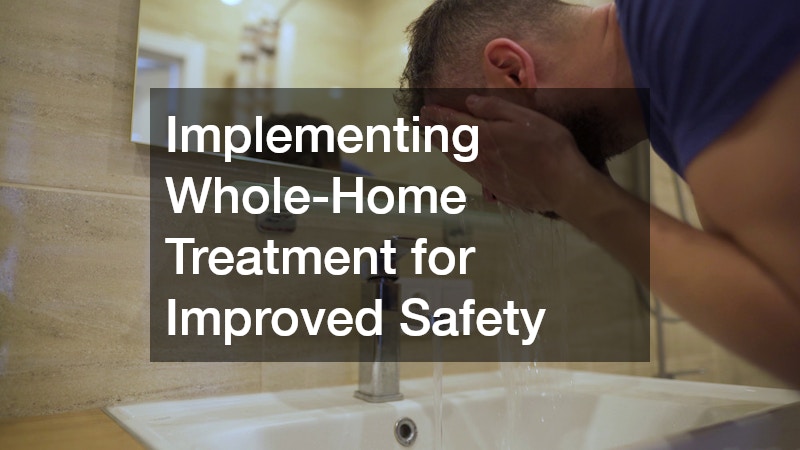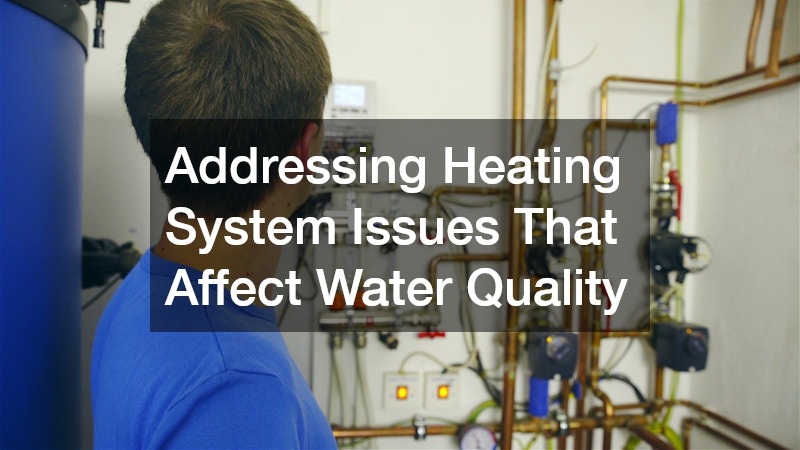Ensuring clean, consistent, and safe water at home is essential for health, comfort, and overall well-being. Whether a property relies on a municipal connection or an independent well, the systems that manage, heat, filter, distribute, and protect the water supply determine how dependable it will be each day. Modern solutions are more advanced than ever, giving homeowners a wide range of options for improving efficiency, reducing contaminants, and ensuring access even in challenging conditions. When comparing today’s most effective home water solutions, it becomes clear that the right systems can dramatically improve water quality and long-term performance. In this guide, you’ll discover the top features, technologies, and setups that support reliable home water quality and how each one contributes to a strong overall infrastructure.
Using the right combination of solutions ensures that residential water systems remain dependable across seasons, conditions, and the natural changes that occur in any property’s water usage. From heating equipment to filtration to waste-handling components, every layer matters. The following sections break each category down in detail to help you determine the best match for your home.
Enhancing Water Heating Performance for Long-Term Efficiency
Heating water plays a major role in overall water system reliability. When a household depends heavily on hot water, any inefficiency or performance inconsistency affects comfort and operating costs. That’s why many homeowners upgrade their systems to include options like tankless water heaters, which provide an endless supply of hot water without the standby losses associated with traditional tanks. These systems deliver heat on demand, making them an energy-efficient investment for families with high usage patterns. Situations where hot water needs fluctuate rapidly throughout the day, especially benefit, because the system adjusts output automatically.
Reliable hot water delivery contributes to the strength of residential water systems by ensuring stable performance year-round. Even in colder climates where incoming water temperatures drop significantly in winter, a dependable heating configuration helps maintain consistent pressure and temperature. While traditional systems may struggle to keep up during peak usage, modern setups offer greater precision and control. Many homeowners also pair updated heating equipment with monitoring tools that track performance and help identify issues before they escalate.
Another advantage of advanced heating components is their flexibility. They can be integrated with other upgrades designed to improve overall water quality. When paired with filtration, pressure-boosting equipment, or smart home controls, these heaters help create a smooth and predictable outcome throughout daily routines. Because home plumbing systems are interconnected, improvements in heating efficiency also reduce strain on pipes and fixture components. Over time, this approach supports durability across the entire infrastructure and aligns seamlessly with the goals of reliable residential water systems. Whether you are considering replacing an outdated heater or building a new property from the ground up, evaluating modern heating options is an essential first step toward long-lasting water quality.
Improving Water Purity and Taste Through Advanced Filtration
Filtration is one of the most important components in achieving clean, safe household water. Whether a property draws from a city source or a private well, contaminants can enter the supply at multiple points. Homeowners today commonly rely on water filter services to install, maintain, and update the systems that remove sediment, chlorine, heavy metals, and potential microorganisms. High-capacity filters are especially useful in areas with known water quality issues, as they can provide continuous purification without significant pressure loss.
Filtration greatly supports residential water systems by ensuring that water entering appliances, fixtures, and heating equipment meets quality standards. Clean water slows scale buildup in plumbing lines, reduces wear on mechanical components, and enhances everyday convenience. Modern filtration options include carbon filters, reverse osmosis membranes, UV purifiers, and multi-stage systems designed for comprehensive treatment. Because each home’s water chemistry varies, professionals tailor the configuration to meet specific needs.
Another vital benefit of updated filtration is taste and odor improvement. Even when water meets legal safety standards, mineral content and disinfectant use often create unpleasant tastes. Filtration systems eliminate these issues, making all household water more enjoyable and safe. Improved water quality also means fewer stains on fixtures, cleaner dishes, and better performance from water-using appliances.
Homeowners increasingly incorporate filtration into broader residential water systems to pack multiple benefits into one solution. For example, pairing high-capacity filters with pressure regulators or water softening systems significantly improves the consistency of household water. Many modern systems also feature smart-monitoring tools that alert users when filters need replacement, ensuring reliable operation at all times. By building filtration into a home’s core water infrastructure, households can protect their plumbing, enhance comfort, and maintain dependable quality over the long term.
Supporting Independent Water Sources for Greater Reliability
Homes that rely on private wells require additional components to secure a steady and safe water supply. Professional water well install services play a central role in building a dependable foundation. A properly designed well ensures access to fresh groundwater, but the installation process must account for depth, soil structure, water table fluctuations, and local regulations. When wells are constructed correctly, they can provide decades of high-quality water with minimal interruption.
An effective well setup becomes a strong core component of residential water systems. Once the well is established, homeowners must consider supporting equipment such as pressure tanks, control switches, treatment devices, and filtration units. While the well itself provides water, this additional equipment ensures that water reaches the home with stable pressure, safe quality, and consistent volume. Without these elements, even a well-produced supply may experience service interruptions.
Wells also allow homeowners independence from municipal water sources. This can be a major advantage in rural areas or in regions where infrastructure is aging or unreliable. However, relying on groundwater requires diligent monitoring and periodic testing. Professional well inspections help identify mineral shifts, water level changes, and potential contamination. Proactive testing ensures the household has early notice of any changes that may require equipment adjustments or treatment.
Because wells are long-term investments, maintaining their structural integrity is essential. This includes protecting the well casing, ensuring the cap is sealed, and monitoring for surface runoff risks. Homeowners often work with specialists who provide ongoing support and maintenance recommendations. With the right installation and long-term care, wells integrate seamlessly into reliable residential water systems. The result is consistent access to clean water supported by a combination of high-quality components and proactive maintenance strategies.
Maintaining Pump Performance for Consistent Water Flow
Pump equipment plays a crucial role in the function of any well-based home water source. When homeowners schedule well pump repairs, they ensure that water is delivered to the household with the right pressure and volume. Pumps operate frequently throughout the day, responding each time water is used. Any issue with the pump—such as reduced output, malfunctioning pressure switches, damaged wiring, or worn mechanical components—can lead to noticeable changes in household water performance.
Maintaining pump health is vital to the overall reliability of residential water systems. Pumps that struggle to operate correctly may cause sputtering faucets, inconsistent temperatures, or long delays in hot water delivery. They can also force other components—like filtration systems and water heaters—to work harder than they should. Over time, this results in premature wear and the potential for higher repair costs.
Homeowners rely on pump systems not only for daily activities such as washing, bathing, and cooking but also for maintaining irrigation systems and outdoor water access. Ensuring the pump operates smoothly prevents disruption and sustains a high quality of living. A healthy pump strengthens the entire water infrastructure, forming an important link in dependable residential water systems. With routine inspections and timely repairs, pumps can operate efficiently for many years, supporting consistent and uninterrupted water flow.
Implementing Whole-Home Treatment for Improved Safety
Water quality concerns affect both municipal and well-based homes. Many households choose to work with water treatment companies to install systems that address minerals, chemicals, and potential contaminants at the source. Treatment solutions can include water softening units, iron filters, neutralizers, UV disinfecting systems, and advanced purification setups. By applying treatment before water enters household fixtures, these systems eliminate many common issues that reduce quality and safety.
Treatment systems play a major role in strengthening residential water systems. Hard water, for example, can cause mineral scale that damages appliances and decreases water pressure. Chemical imbalances may cause staining, discoloration, or changes in taste. Treatment equipment corrects these issues automatically, delivering reliable water throughout the home.
Another key benefit of whole-home treatment is long-term system protection. Pipes, heaters, and pumps last longer when water chemistry remains stable. Because treatment systems often work alongside filtration units, they enhance purification while protecting household infrastructure. As treatment technologies continue to advance, homeowners gain access to more precise systems capable of addressing unique water chemistry challenges.
Many households also choose treatment systems for environmental and lifestyle reasons. Softer water improves soap efficiency, reduces detergent waste, and minimizes the need for harsh cleaning products. UV purification systems eliminate the need for chemical disinfectants. Treatment companies help homeowners select the best configuration for their water source and long-term goals. With professional installation and ongoing maintenance, treatment equipment becomes an integral part of dependable residential water systems that offer lasting safety, performance, and comfort.
Securing Reliable Water Access During Shortages or Emergencies
Some homes, particularly rural properties or areas prone to supply disruptions, rely on a bulk water delivery service to supplement or temporarily replace their normal water source. Delivery services ensure access to clean, potable water when wells run low, when repairs are underway, or during severe weather events. This option provides emergency support for drinking, cooking, sanitation, livestock, and irrigation needs.
Incorporating delivery options into residential water systems offers a valuable safety net. Even high-performing wells may experience temporary drops in output during drought conditions or seasonal shifts. Municipal service interruptions—though less common—can occur during infrastructure failures or contamination events. Delivery services help bridge these gaps while long-term solutions are implemented.
Reliable access to supplemental water also protects essential household equipment. When pumps attempt to run without an adequate water supply, mechanical damage may occur. Delivery services prevent this risk by restoring supply volumes before equipment is affected. Some homeowners also schedule regular deliveries during periods of high usage, particularly for large households or properties with extensive outdoor watering needs.
Addressing Heating System Issues That Affect Water Quality
Although many homeowners associate heating equipment primarily with indoor climate control, systems such as home boilers play a crucial role in the overall water infrastructure. When households schedule boiler repair, they address mechanical issues that can impact both water quality and heating consistency. Boilers that malfunction may lead to temperature fluctuations, water discoloration, unusual noises, or reduced efficiency.
A well-maintained boiler supports the larger framework of residential water systems by ensuring a consistent hot water supply and stable heating performance. When boilers operate correctly, they reduce strain on plumbing lines, protect fixtures, and support household comfort. Repairs may involve replacing worn valves, flushing the system, adjusting pressure levels, or correcting ignition issues. Technicians also ensure that combustion components operate safely.
Neglecting boiler issues can lead to corrosion, leaks, and reduced lifespan. In severe cases, untreated problems may increase energy consumption or create safety hazards. Homeowners benefit from annual inspections that identify sediment accumulation or component wear. When paired with water-treatment and filtration systems, boilers enjoy improved performance and longevity because cleaner water minimizes mineral buildup.
Managing Wastewater Needs for Household Protection and Compliance
Waste-handling systems significantly affect home water quality and safety. Properties that rely on septic setups require services such as septic repair, which address issues that occur when tanks, drainage fields, or connecting pipes begin to fail. Wastewater backups, unpleasant odors, slow drains, and standing water on the lawn are common signs that a repair is needed. Addressing these issues quickly protects both indoor plumbing and environmental health.
A functional waste-handling setup plays a vital role in residential water systems because wastewater flow affects the household’s entire plumbing network. When septic components malfunction, pressure fluctuations, backups, and contamination risks increase. Professional repairs ensure that waste is processed correctly and discharged safely into the drain field.
In addition to repair work, ongoing septic tank maintenance supports long-term performance. Regular pumping prevents solids from accumulating to levels that cause system failures. Professional inspections help identify root intrusion, pipe damage, or tank corrosion, allowing homeowners to correct issues before they worsen.
Properties that do not yet have wastewater systems installed may require a new septic system, particularly during major home additions or new construction. Modern designs improve reliability, reduce environmental impact, and support the long-term performance of household plumbing.








